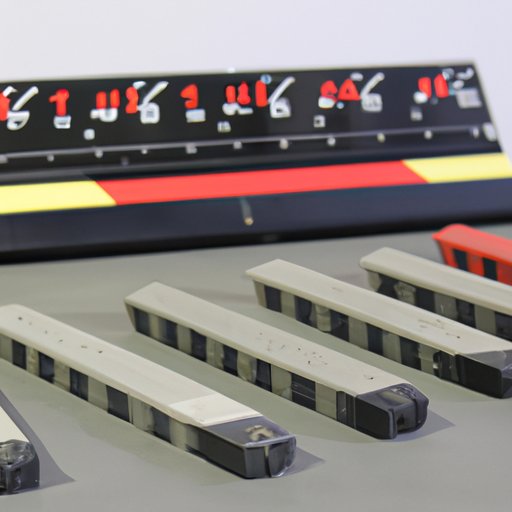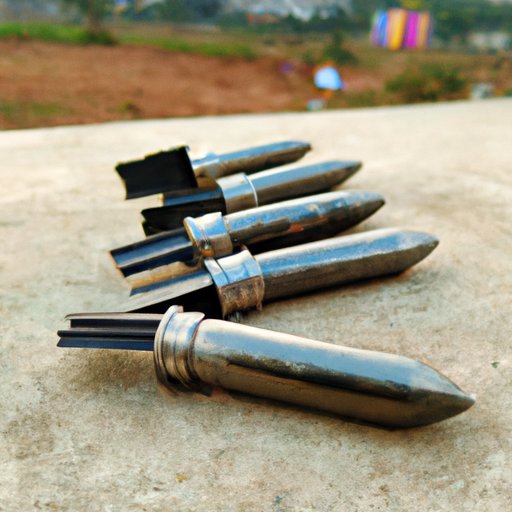Introduction: What Speed Do Bullets Travel?
Bullets are objects that travel at incredibly high speeds. But what speed do bullets travel? This is a question that has been asked by curious minds for centuries. In this article, we will explore the physics of bullet trajectory and velocity, compare different types of ammunition and their speeds, examine the correlation between caliber and speed, and analyze the impact of exterior conditions on bullet velocity.
Exploring the Physics of Bullet Trajectory and Velocity
The physics of a bullet in motion are complex. Bullets are propelled from a gun barrel by an explosive force created by rapidly burning gunpowder. As the bullet leaves the barrel, it is affected by several forces, including gravity, air resistance, and drag. The combination of these forces affects the trajectory of the bullet, which is determined by its speed and angle of launch.
The forces acting on a bullet can be calculated using Newton’s Laws of Motion. According to Newton’s Second Law of Motion, the acceleration of an object is directly proportional to the net force acting on it and inversely proportional to its mass. Therefore, the greater the force acting on the bullet, the faster it will accelerate.
Calculating the velocity of a bullet is not an easy task. It is affected by a variety of factors, such as the type of gun used, the type of ammunition, the barrel length, and the external environment. To accurately calculate the velocity of a bullet, all of these factors must be taken into account.

Comparing Different Types of Ammunition and Their Speeds
The type of ammunition used will have a significant impact on the speed of a bullet. Rifle ammunition is typically faster than handgun ammunition, and shotgun shells are slower still. On average, rifle ammunition travels at speeds of up to 3,000 feet per second, while handgun ammunition travels at speeds of up to 1,500 feet per second. Shotgun shells travel at speeds of up to 1,200 feet per second.
The Role of Barrel Length in Determining a Bullet’s Speed
The length of a gun’s barrel can have a major effect on the speed of a bullet. Generally speaking, longer barrels will produce higher velocities, while shorter barrels will produce lower velocities. This is because longer barrels provide more time for the expanding gases from the burning gunpowder to push the bullet out of the barrel, thus increasing its speed.

Examining the Correlation Between Caliber and Speed
The caliber of a bullet is also an important factor in determining its speed. Generally speaking, larger caliber bullets will travel faster than smaller caliber bullets. This is because larger caliber bullets have more mass, allowing them to accelerate faster and reach higher velocities.
However, there are several other factors that can affect the speed of a bullet. These include the type of powder used, the amount of powder used, the shape of the bullet, and the length of the barrel. All of these factors can have a significant impact on the speed of a bullet.

Analyzing the Impact of Exterior Conditions on Bullet Velocity
The external environment can also affect the speed of a bullet. Wind resistance can slow down a bullet, while temperature can cause a bullet to expand or contract, leading to changes in its trajectory and speed. Altitude can also play a role in determining the speed of a bullet, as the air is thinner at higher altitudes, resulting in less drag on the bullet.
Conclusion: What Speed Do Bullets Travel?
In this article, we explored what speed do bullets travel? We examined the physics of bullet trajectory and velocity and compared different types of ammunition and their speeds. We also looked at the role of barrel length and caliber in determining a bullet’s speed, as well as the impact of exterior conditions on bullet velocity.
It is clear that the speed of a bullet is determined by a variety of factors, including the type of ammunition used, the length of the barrel, the caliber of the bullet, and the external environment. Understanding these factors can help shooters better understand the speed of a bullet and improve their accuracy.
By understanding the physics of bullet trajectory and velocity and taking into account the various factors that can affect the speed of a bullet, shooters can become more accurate and successful in their shooting endeavors.
(Note: Is this article not meeting your expectations? Do you have knowledge or insights to share? Unlock new opportunities and expand your reach by joining our authors team. Click Registration to join us and share your expertise with our readers.)
